The NVIDIA GeForce GTX 970 Review: Featuring EVGA
by Ryan Smith on September 26, 2014 10:00 AM ESTCompute
With GTX 980 NVIDIA surprised us with their stunning turnaround in in GPU compute performance, which saw them capable of reaching the top in many compute benchmarks they couldn’t before. GTX 970 meanwhile should benefit from these architectural and driver improvements, though since compute is nearly analogous to shader performance this is also a case where the performance difference between the GTX 970 and GTX 980 stands to be among its widest.
As always we’ll start with LuxMark2.0, the official benchmark of SmallLuxGPU 2.0. SmallLuxGPU is an OpenCL accelerated ray tracer that is part of the larger LuxRender suite. Ray tracing has become a stronghold for GPUs in recent years as ray tracing maps well to GPU pipelines, allowing artists to render scenes much more quickly than with CPUs alone
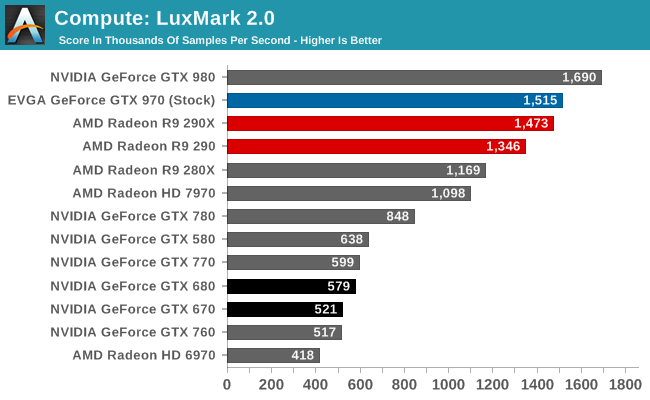
Thanks to GTX 980 taking the top spot here, GTX 970 still maintains a small lead over R9 290XU. So even with the GTX 970's weaker performance, it can still manage to outperform AMD's flagship in this case.
For our second set of compute benchmarks we have CompuBench 1.5, the successor to CLBenchmark. We’re not due for a benchmark suite refresh until the end of the year, however as CLBenchmark does not know what to make of GTX 980 and is rather old overall, we’ve upgraded to CompBench 1.5 for this review.
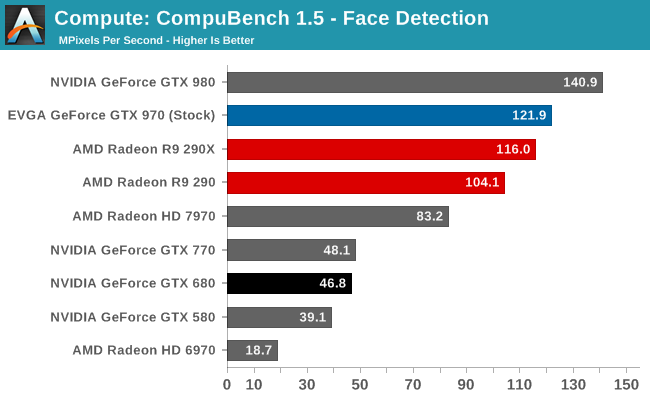
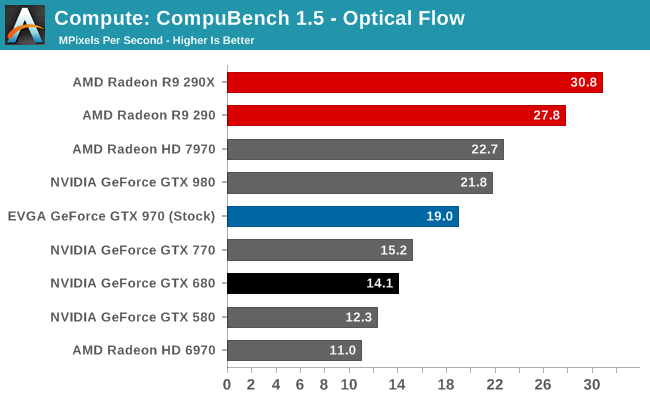
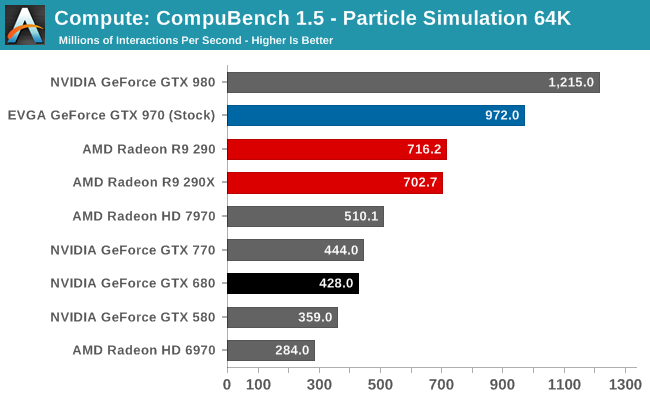
In the cases where the GTX 980 does well, so does the GTX 970. In the cases where the GTX 980 wasn’t fast enough to top the charts, the GTX 970 will be similarly close behind. Overall compared to AMD’s lineup we see the whole gamut, from a tie between the GTX 970 and R9 290XU to victories for either card.
Our 3rd compute benchmark is Sony Vegas Pro 12, an OpenGL and OpenCL video editing and authoring package. Vegas can use GPUs in a few different ways, the primary uses being to accelerate the video effects and compositing process itself, and in the video encoding step. With video encoding being increasingly offloaded to dedicated DSPs these days we’re focusing on the editing and compositing process, rendering to a low CPU overhead format (XDCAM EX). This specific test comes from Sony, and measures how long it takes to render a video.
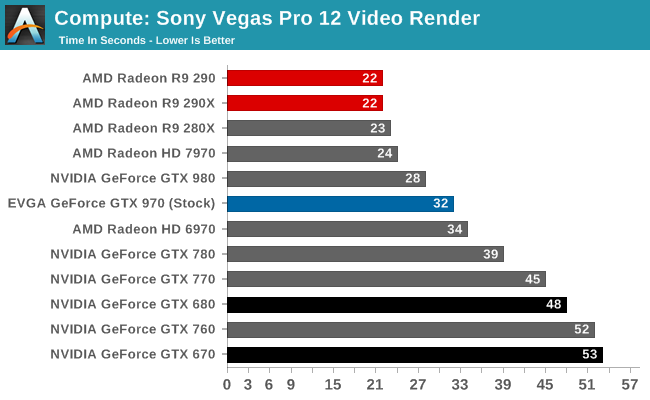
As expected, GTX 970 sheds a bit of performance here. AMD still holds a lead here overall, and against GTX 970 that lead is a little bit larger.
Moving on, our 4th compute benchmark is FAHBench, the official Folding @ Home benchmark. Folding @ Home is the popular Stanford-backed research and distributed computing initiative that has work distributed to millions of volunteer computers over the internet, each of which is responsible for a tiny slice of a protein folding simulation. FAHBench can test both single precision and double precision floating point performance, with single precision being the most useful metric for most consumer cards due to their low double precision performance. Each precision has two modes, explicit and implicit, the difference being whether water atoms are included in the simulation, which adds quite a bit of work and overhead. This is another OpenCL test, utilizing the OpenCL path for FAHCore 17.
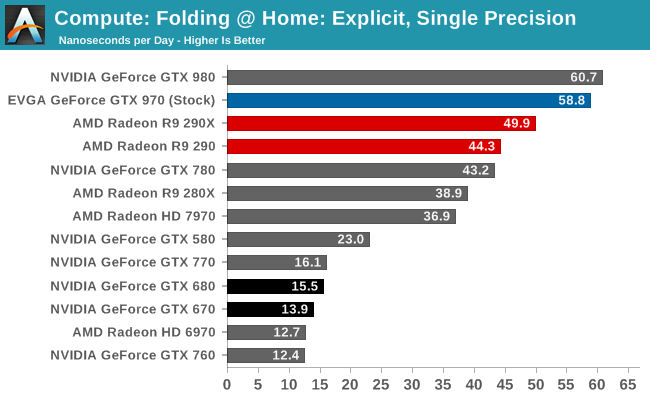
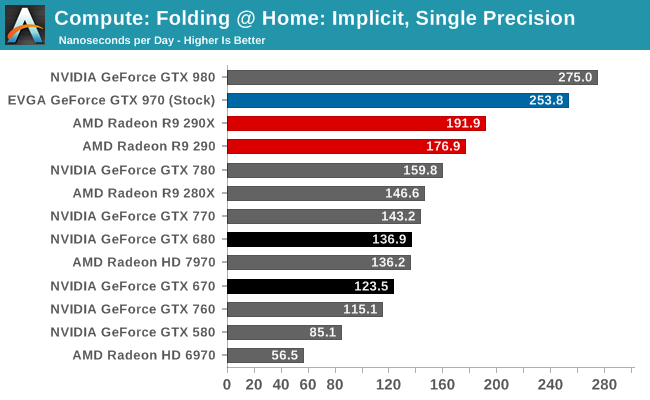
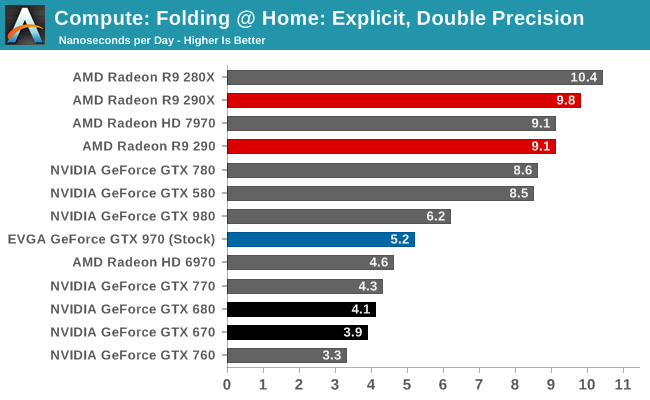
With the GTX 980 holding such a commanding lead here, even with the GTX 970’s lower performance it still is more than enough to easily beat any other card in single precision Folding @ Home workloads. Only in double precision with NVIDIA’s anemic 1:32 ratio does GTX 970 falter.
Wrapping things up, our final compute benchmark is an in-house project developed by our very own Dr. Ian Cutress. SystemCompute is our first C++ AMP benchmark, utilizing Microsoft’s simple C++ extensions to allow the easy use of GPU computing in C++ programs. SystemCompute in turn is a collection of benchmarks for several different fundamental compute algorithms, with the final score represented in points. DirectCompute is the compute backend for C++ AMP on Windows, so this forms our other DirectCompute test.
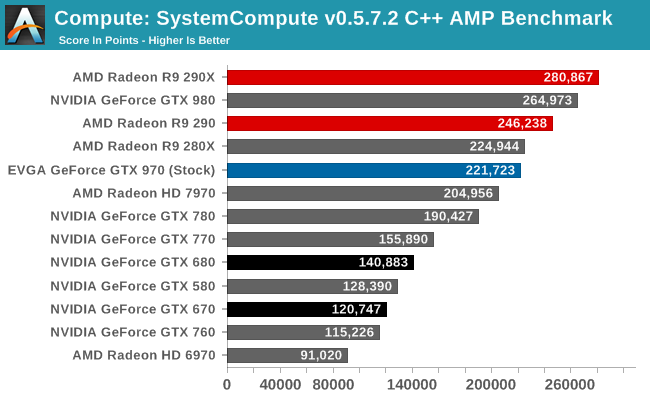
Recently this has been a stronger benchmark for AMD cards than NVIDIA cards, and consequently GTX 970 doesn’t enjoy quite the lead it sees elsewhere. Though not too far behind R9 280X and even R9 290, like GTX 980 it can’t crunch numbers quite fast enough to keep up with R9 290XU.










155 Comments
View All Comments
LancerVI - Saturday, September 27, 2014 - link
Looks good! Mostly a side-grade for my 290's, but I knew that already. Probably the best purchase I made in a while, those 290's are gonna last me a bit. May have to ebay a 3rd for some tri-fire. I'll go nVidia next round depending, but I'm really impressed with the 980/970, but 290's right now are a steal!Impulses - Sunday, September 28, 2014 - link
Did the prices drop significantly? I'm scared to look, I got mine for $350 (after rebate) and $360 about a month ago, didn't see anything priced that low immediately after the 980/970 launch but... You'd think AMD would now have to at least match 970 pricing with the 290 in order to sell any at all.Impulses - Sunday, September 28, 2014 - link
FWIW, I did think the price I paid for the 290s was pretty terrific and haven't regretted it yet... When looking at SLI vs CF tests the performance gaps from game to game are even narrower, a huge AMD price drop would be slightly irksome tho I understand it's bound to happen. OTOH, being so close to the holiday season I doubt we'd see any good sale prices atop any price drops or beyond the 980/970 price points.Death666Angel - Saturday, September 27, 2014 - link
The 980 and 970 make me excited for what nVidia (and hopefully AMD) has in store for 20nm next year. I'm not going to upgrade from my water cooled 7970 (35% chip and 20% memory OC) for another 28nm GPU, even if nVidia managed to squeeze a lot out of the process.StormFuror - Saturday, September 27, 2014 - link
Wow, I didn't expect the 970 to pull up stats like this compared to the 780. I don't know why, lol. The power consumption from the horsepower this card throws down is rather impressive compared to AMD's R9's. I may have to get one of these. I'm stuck with one monitor @ 1920x1080. This card will give me 60 FPS in just about everything it seems, probably over kill. But this seems like it'll hold me over until I have to do a complete new rebuild down the road(when I upgrade to 4k). I've got a couple years :)eek2121 - Sunday, September 28, 2014 - link
I know AT's benchmarks portrays the Radeon 6970 as 'slow as balls' when it comes to gaming recent titles, but as someone who games more than most (on a 1080p monitor), i still find very little incentive to upgrade. Maybe if i gamed at higher resolutions.... Haven't really encountered a game (worth playing) that doesn't run on ultra settings in 1080p. Then again, steam has been shifting my dollars away from top tier games towards indie games for a while now. I own 425 games on steam and all of them give me no issue on my 'old' graphics card. Not knocking the new geforce cards at all....just wish developers would push the envelope a bit more.TiGr1982 - Sunday, September 28, 2014 - link
Wel, old VLIW4-based HD 6970 is, say, something around 1/3 (33%) slower than GCN-based R9 280 aka HD 7950 Boost (which I have, BTW). But I believe that 6970 is more or less still good enough for 1080p, and, besides, probably the drivers for HD 6970 are pretty mature since HD 6970 is nearly 4 years old now (plus, Trinity and Richland also have VLIW4-based GPU, just 1/4 of HD 6970's Cayman GPU).just4U - Sunday, September 28, 2014 - link
The biggest thing for me is this..." For much of the last year NVIDIA has been more than performance competitive but not price competitive with AMD."
------
That's been a major bone of contention with me. They corrected pricing which was very much in line and competitive during the 460-80 days. Then went out to lunch thru the 560-80 era and marginally came back (almost not quite..) during the 660-80 only to head way out to lunch again with their 7x series. It boggles the mind and makes it hard to purchase when AMD is offering great deals on their end /w similar performance.
hamiltus - Sunday, September 28, 2014 - link
So my main question is if the GTX 970 is a good upgrade from the GTX 670 for 1440p/4K gaming?coldpower27 - Sunday, September 28, 2014 - link
This is a solid upgrade, just thinking if this is worth it over GTX 670 as well. Slightly more power consumption for much greater performance and similar idle performance numbers.970 has a nice ring to it. :)